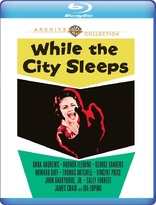While the City Sleeps Blu-ray Movie
HomeWhile the City Sleeps Blu-ray Movie 
Warner Bros. | 1956 | 100 min | Not rated | Mar 13, 2018Movie rating
6.7 | / 10 |
Blu-ray rating
| Users | 4.0 | |
| Reviewer | 3.0 | |
| Overall | 3.0 |
Overview
While the City Sleeps (1956)
A serial killer has been killing beautiful women in New York, and the new owner of a media company offers a high ranking job to the 1st administrator who can get the earliest scoops on the case.
Starring: Dana Andrews, Rhonda Fleming, George Sanders (I), Howard Duff, Thomas Mitchell (I)Director: Fritz Lang
| Film-Noir | 100% |
| Crime | Insignificant |
| Drama | Insignificant |
Specifications
Video
Video codec: MPEG-4 AVC
Video resolution: 1080p
Aspect ratio: 2.00:1
Original aspect ratio: 1.85:1
Audio
English: DTS-HD Master Audio 2.0 Mono (48kHz, 24-bit)
Subtitles
English SDH
Discs
Blu-ray Disc
Single disc (1 BD)
Playback
Region free
Review
Rating summary
| Movie | 3.0 | |
| Video | 3.5 | |
| Audio | 3.5 | |
| Extras | 0.5 | |
| Overall | 3.0 |
While the City Sleeps Blu-ray Movie Review
The Front Page—at Any Cost
Reviewed by Michael Reuben March 29, 2018When director Fritz Lang arrived in Hollywood in 1936 among the flood of refugees from the
Third Reich, he had already made many of the films on which his reputation rests today,
including Metropolis, M and Dr. Mabuse: The Gambler. But Lang continued working in exile,
directing twenty American projects before returning to Europe in 1957. Some of those films are
noteworthy additions to an already impressive filmography (e.g., Fury and
The Big Heat), but the
director's final two American films are more curiosities than classics. While the City Sleeps and
Beyond a Reasonable Doubt
were both released in 1956 by RKO Pictures, whose library is now
owned by Warner Brothers, and both films have been given new transfers for Blu-ray by the
Warner Archive Collection.
While the City Sleeps is the better of the pair, in part because of its impressive assembly of acting
talent (a point highlighted in the film's advertising), but also because its cynical portrait of a
media empire more interested in sales than public service remains a timely tale, even as sweeping
changes in the technology for disseminating information have rendered the film's chatter about
wire services and early editions quaintly antique.
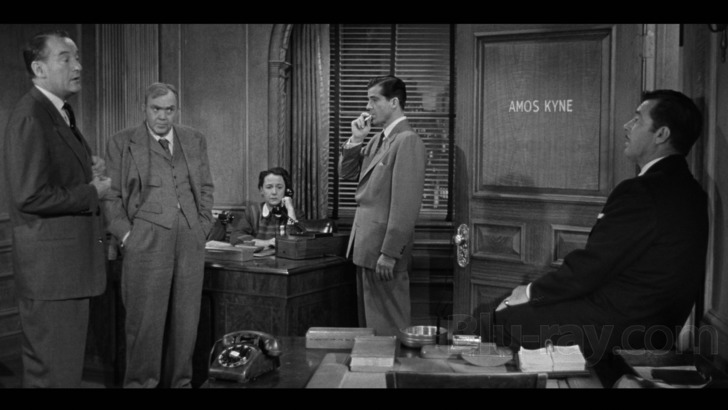
City Sleeps has a script by Casey Robinson, who was sometimes described as the "master of adaptation" because of his skill at turning established properties into movie scripts. Famous examples include the Bette Davis classics Dark Victory (from a play) and Now, Voyager (from a novel). In City Sleeps, Robinson was adapting a crime novel entitled The Bloody Spur about a deranged serial killer, but Robinson and Lang quickly push the murderer to the background, focusing instead on the sensationalist bonanza he provides for the media empire of Kyne, Inc. The firm's founder, Amos Kyne (Robert Warwick), is lying on his deathbed when he spots the story of a killer who scrawled "Ask Mother" in lipstick on his victim's wall. As one of his last acts before expiring, Kyne instructs his chief lieutenants to hype the case with headlines about "The Lipstick Killer".
The Lipstick Killer reappears periodically throughout City Sleeps, played by John Barrymore Jr. in an overly broad style that suggests his famous father's silent screen persona. Eventually the killer gets uncomfortably close to some of Kyne, Inc.'s employees, but for most of the film he remains a distant presence, as a battle rages to succeed Amos Kyne for control of his media conglomerate. Kyne's son, Walter (Vincent Price), is the new owner, but he has no idea what he's doing; so he dangles the top job of executive editor before a team of rivals consisting of John Day Griffith (Thomas Mitchell), the salty editor of the New York Sentinel; photographer Harry Kritzer (James Craig); and wire services chief Mark Loving (George Sanders). Also in the mix is reporter and lead newscaster Ed Mobley (Dana Andrews), who would have been Amos Kyne's choice for the job, except that he doesn't want it.
Lang expertly orchestrates the overlapping plots and machinations of the Kyne competitors, including their romantic entanglements, which (no surprise here) are inextricably intertwined with their professional lives. Ed Mobley, the face of Kyne network news, is dating Nancy Liggett (Sally Forrest), who is secretary to Loving, head of the wire service. Loving, in turn, is dating Sentinel columnist Mildred Donner (Ida Lupino), and she's full of helpful advice—but who is she really helping? (Lupino's off-screen husband, Howard Duff, has a small role as the cop in charge of The Lipstick Killer case.) Meanwhile, the wife of the newly installed owner of Kyne, Inc., Dorothy (Rhonda Fleming), is having a clandestine affair with Kritzer, the photographer, in a love nest that just happens to be in the same building—indeed, across the hall—from Nancy Liggett's apartment. And yes, that coincidence becomes an important plot point.
The Lipstick Killer is eventually caught, though not before he claims some additional victims, and certainly not before he threatens the life of someone from the Kyne, Inc. family. It gives nothing away to reveal that the police aren't the ones who catch him. No, it's the intrepid journalists of the Kyne media empire, who actually manage to perform a public service in the course of pursuing career advancement and erotic fulfillment. By the end of City Sleeps, the succession at Kyne has been resolved and new owner Walter Kyne has receded into the background where he belongs. The Lipstick Killer investigation was key to the outcome, but not in a way anyone at Kyne might have predicted.
Although City Sleeps isn't particularly funny, it plays at an oddly staccato rhythm that often feels borrowed from screwball comedy. Both the director and the screenwriter seem to have delighted in finding ways to smuggle sexual references past the blue noses charged with enforcing the Hays Code. Look, for example, at how Lang frames the conversation between Kritzer and Dorothy Kyne when they meet for an assignation; they're just talking, but the bed behind them juts prominently into the frame (see screenshot 3). And Ed Mobley's exchanges with Nancy are filled with pregnant phrasing that would have suited Bogart and Bacall in The Big Sleep:
Ed: [holding Nancy in her apartment doorway as they prepare to say goodnight]: I should have a permit.
Nancy: To kiss me?
Ed: Hmm . . . an explorer's permit.
Nancy: Do explorers have to have permits?
Ed: They should have, especially when they're headed for uncharted territory.
While the City Sleeps Blu-ray Movie, Video Quality 
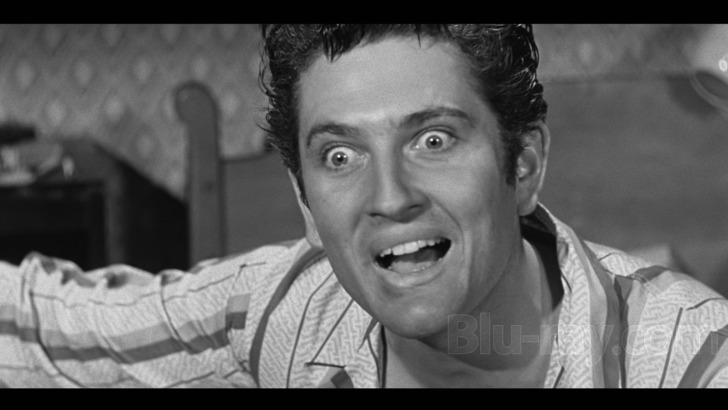
While the City Sleeps was shot by Ernest Laszlo (Ship of Fools) in a process that was advertised
as "RKO-Scope", which was RKO Pictures' branding of a format known as Superscope.
Superscope was an attempt to create a widescreen image to compete with Fox's Cinemascope but
without the distortions and intense lighting requirements of the first generation of anamorphic
lenses. The full 35mm frame was exposed, but the image was matted in post-production at a ratio
of 2.00:1. Release prints were created in several formats, including a version with an anamorphic
squeeze that could be projected as if they were Cinemascope prints. (The Super35 format widely
used today for projects shot on film is a direct descendant of Superscope.)
Like many of the mid-Fifties widescreen experiments, Superscope was short-lived, as the
industry ultimately settled on the twin formats of "flat" 1.85:1 and anamorphic 2.35:1 that remain
standard to this day. For this 1080p, AVC-encoded Blu-ray of City Sleeps, the Warner Archive
Collection has formatted the film in its originally intended 2.00:1 aspect ratio. The 1080p master
was derived from a fine-grain master positive that dates back to the film's original release, which
was scanned at 2K by Warner's Motion Picture Imaging facility, followed by extensive color
correction and WAC's usual thorough cleanup to eliminate scratches, dust marks and other
imperfections. The resulting image is somewhat disappointing in its overall softness, although
closeups and medium shots fare much better than long shots capturing the entirety of the Kyne
news operation, or the street exteriors shot on the Warner backlot or, in the film's single action
set piece, a chase through the L.A. subway tunnels. Despite the overall softness, the blacks are
solid, the shades of gray are finely delineated, and the film's grain pattern has been naturally
rendered. A better result might have been possible with either a 4K scan from negative or the
creation of a new fine-grain using contemporary stocks, but either of these options would be
prohibitively expensive for a catalog title of limited appeal.
WAC has mastered City Sleeps at its usual high bitrate, here 34.99 Mbps.
While the City Sleeps Blu-ray Movie, Audio Quality 
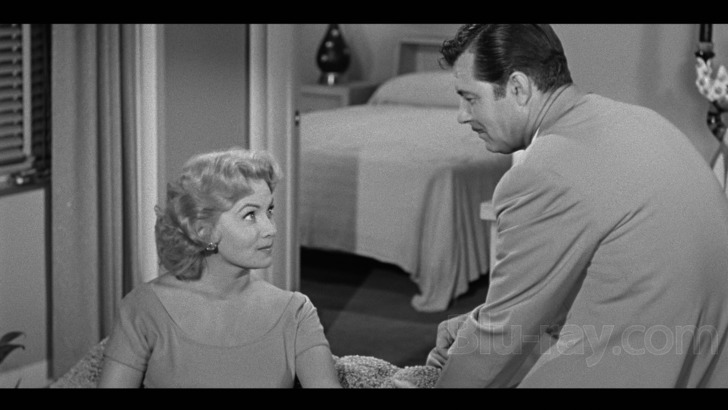
In its waning years, RKO Pictures did not preserve magnetic sound masters. The mono soundtrack for While the City Sleeps has been taken from an optical track, cleaned of clicks, pops and age-related distortion, and encoded on Blu-ray in lossless DTS-HD MA 2.0. It's a serviceable track, with consistently intelligible dialogue and essential sound effects. The score by Herschel Burke Gilbert (who would reunite with Lang on Beyond a Reasonable Doubt) effectively shifts between the story's suspense elements and its newsroom drama.
While the City Sleeps Blu-ray Movie, Special Features and Extras 
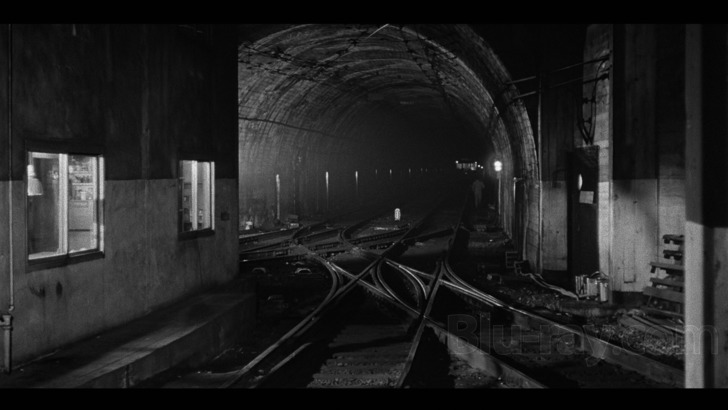
The only extra is the film's trailer (1080p; 2..00:1; 2:27), which has been remastered in 1080p. WAC's 2011 DVD of Doubt was similarly bare.
While the City Sleeps Blu-ray Movie, Overall Score and Recommendation 
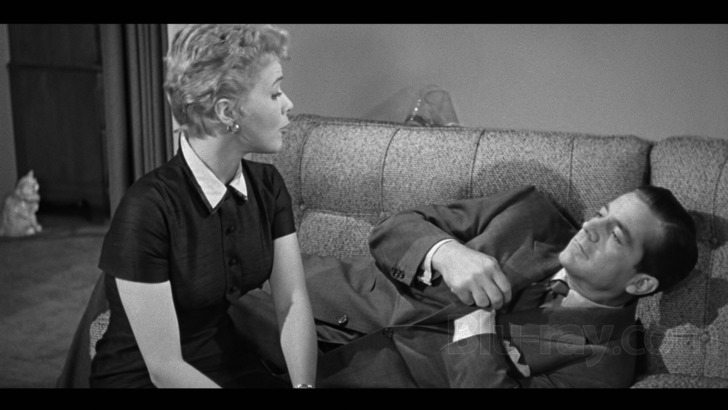
While the City Sleeps isn't a great film, but it's skillfully made, and the energy of so many
Hollywood pros playing off each other gives the film enough forward motion to carry it over
some of the plot's contrivances. It's unfortunate that WAC couldn't make it look better, but it
certainly looks better than it ever has (or, barring a further restoration, ever will). Admirers and
collectors of Fritz Lang's films will no doubt be delighted, but newcomers to his work might
want to start elsewhere.
Similar titles
Similar titles you might also like

Union Station
1950

On Dangerous Ground
Warner Archive Collection
1951

Phantom Lady
1944

The Shadow on the Window
1957

Witness to Murder
1954

Private Hell 36
1954

The Chase
Special Edition
1946

Detective Story
1951

The Killer is Loose
1956

I Wake Up Screaming
Hot Spot
1941

Dead End
1937

The Dark Corner
1946

Where the Sidewalk Ends
Limited Edition to 3000 - SOLD OUT
1950

Panic in the Streets
Fox Studio Classics
1950

Hidden Fear
1957

The Sleeping City
1950

The Killer That Stalked New York
1950

Brighton Rock
The Boulting Brothers Production of Brighton Rock / Young Scarface
1947

The Naked City
1948

He Walked by Night
4K Restoration
1948
